2008年西藏高考英语考试及答案
2008年普通高等学校招生全国统一考试英语完形填空以及答案详细解析(19套试题)
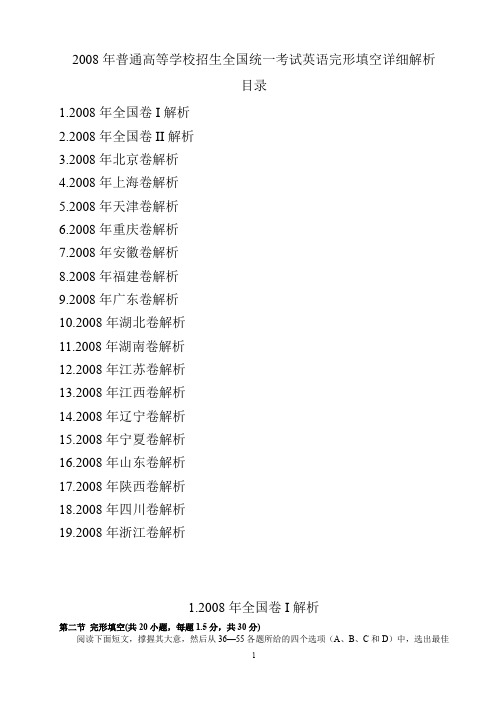
2008年普通高等学校招生全国统一考试英语完形填空详细解析目录1.2008年全国卷I解析2.2008年全国卷II解析3.2008年北京卷解析4.2008年上海卷解析5.2008年天津卷解析6.2008年重庆卷解析7.2008年安徽卷解析8.2008年福建卷解析9.2008年广东卷解析10.2008年湖北卷解析11.2008年湖南卷解析12.2008年江苏卷解析13.2008年江西卷解析14.2008年辽宁卷解析15.2008年宁夏卷解析16.2008年山东卷解析17.2008年陕西卷解析18.2008年四川卷解析19.2008年浙江卷解析1.2008年全国卷I解析第二节完形填空(共20小题,每题1.5分,共30分)阅读下面短文,撑握其大意,然后从36—55各题所给的四个选项(A、B、C和D)中,选出最佳选项,并在答题卡上将该项涂黑。
After the birth of my second child, I got a job at a restaurant. Having worked with an experienced 36 for a few days, I was 37 to wait tables on my own. All went 38 that first week. When Saturday night came, I was luckily 39 the tables not far from the kitchen. 40 , I still felt a little hard to carry the heavy trays (托盘)。
Before I knew it, the 41 was full of people. I moved slowly, 42 every step. I remember how 43 I was when I saw the tray stand near the tables, it looked different from the one I was 44 on. It had nice handles (手柄),which made it 45 to move around. I was pleased with everything and began to 46 I was a natural at this job.Then, an old man came to me and said, “Excuse me, dear, my wife and I loved __47 you work. It seems your tray stand has been very 48 to you, but we are getting ready to 49 now, and my wife needs her 50 back.”At first his 51 did not get across. “What was he talking about!” Then I got it. I had set my trays on his wi fe’s orthopedic walker (助步器). I stood frozen as ice, but my face was 52 . I wanted to get into a hole and 53 .Since then, I have learned from many mistakes such as the one I just 54 , I have learned to be more 55 and not to be too sure of myself.36. A. manager B. assistant C. cook D. waitress【答案】D。
2008高考英语真题答案
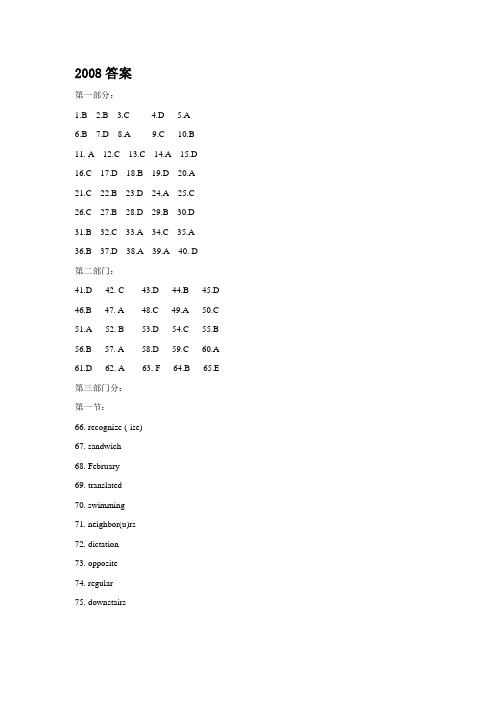
2008答案第一部分:1.B2.B3.C4.D5.A6.B7.D8.A9.C 10.B11. A 12.C 13.C 14.A 15.D 16.C 17.D 18.B 19.D 20.A21.C 22.B 23.D 24.A 25.C26.C 27.B 28.D 29.B 30.D31.B 32.C 33.A 34.C 35.A36.B 37.D 38.A 39.A 40. D第二部门:41.D 42. C 43.D 44.B 45.D 46.B 47. A 48.C 49.A 50.C 51.A 52. B 53.D 54.C 55.B 56.B 57. A 58.D 59.C 60.A 61.D 62. A 63. F 64.B 65.E 第三部门分:第一节:66. recognize (-ise)67. sandwich68. February69. translated70. swimming71. neighbor(u)rs72. dictation73. opposite74. regular75. downstairs第二节:If I have the honor to be chose to work for the 76. chosen29th Olympic Games, I will at first improve myEnglish so that I can talk easily about foreign visitors. 78. with/ toSecond, I will learn more about /\ history of the 79. theOlympics as good as the 2008 Olympic Games. Third, 80. wellsince I was familiar with Beijing, I can help visitors find 81. amtheir ways in the city. Finally, I should be able to tell 82. wayvisitors about our history and culture and show 83. √them their great achievements. In short, I will do 84. ourmy best to help making the Games a success. 85. make五、One Possible Version:June 8, 2008 Dear Peter,I’m glad to receive your letter asking for my advice on how to learn Chinese well.Here are a few suggestions. First, it is important to take a Chinese course, as you’ll be ableto learn from the teacher and practice with your fellow students. Then, it also helps to watch TV and read books, newspapers and magazines in Chinese whenever possible.Besides, it should be a good idea to learn and sing Chinese songs, because by doing so you’ll learn and remember Chinese words more easily. You can also make more Chinese friends. They will tell you a lot about China and help you learn Chinese.Try and write me in Chinese next time.Best wishesLi Hua。
2008年高考试题——英语(江西卷)(含答案解析)
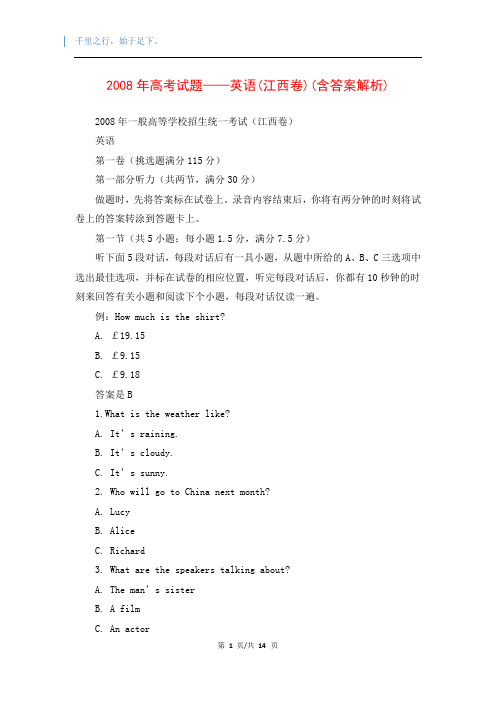
2008年高考试题——英语(江西卷)(含答案解析)2008年一般高等学校招生统一考试(江西卷)英语第一卷(挑选题满分115分)第一部分听力(共两节,满分30分)做题时,先将答案标在试卷上。
录音内容结束后,你将有两分钟的时刻将试卷上的答案转涂到答题卡上。
第一节(共5小题;每小题1.5分,满分7.5分)听下面5段对话,每段对话后有一具小题,从题中所给的A、B、C三选项中选出最佳选项,并标在试卷的相应位置,听完每段对话后,你都有10秒钟的时刻来回答有关小题和阅读下个小题,每段对话仅读一遍。
例:How much is the shirt?A. £19.15B. £9.15C. £9.18答案是B1.What is the weather like?A. It’s raining.B. It’s clou dy.C. It’s sunny.2. Who will go to China next month?A. LucyB. AliceC. Richard3. What are the speakers talking about?A. The man’s sisterB. A filmC. An actor4. Where will the speakers meet?A. In Room 340B. In Room XXXC. In Room 2235. Where does the conversation most probably take place?A. In a restaurantB. In an officeC. At home第二节(共15小题;每小题1.5分;满分22.5分)听下面5段对话或独白,每段对话或独白后有1个小题,从题中所给的A、B、C三个选项中选出最佳选项,并标在试卷的相应位置。
听每段对话或独白钞票,你将有时刻阅读各个小题,每小题5秒钟,听完后,各小题将给出5秒钟的作答时刻,每段对话或独白读两遍。
2008年高考英语试题及答案(北京卷)
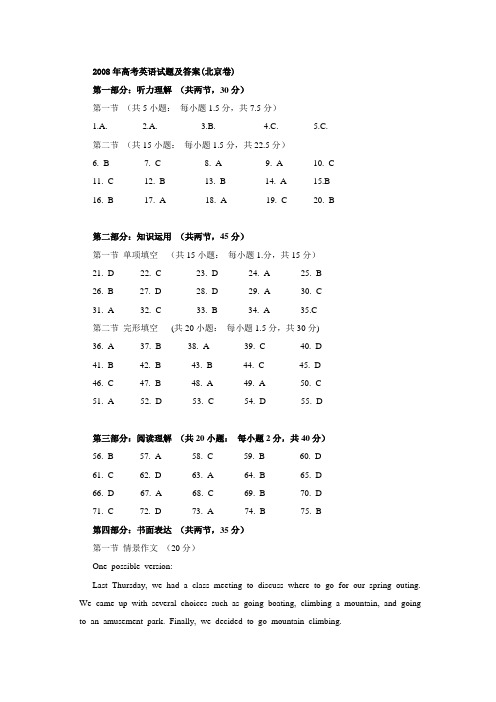
2008年高考英语试题及答案(北京卷)第一部分:听力理解(共两节,30分)第一节(共5小题:每小题1.5分,共7.5分)1.A.2.A.3.B.4.C.5.C.第二节(共15小题:每小题1.5分,共22.5分)6. B7. C8. A9. A 10. C11. C 12. B 13. B 14. A 15.B16. B 17. A 18. A 19. C 20. B第二部分:知识运用(共两节,45分)第一节单项填空(共15小题:每小题1.分,共15分)21. D 22. C 23. D 24. A 25. B26. B 27. D 28. D 29. A 30. C31. A 32. C 33. B 34. A 35.C第二节完形填空(共20小题:每小题1.5分,共30分)36. A 37. B 38. A 39. C 40. D41. B 42. B 43. B 44. C 45. D46. C 47. B 48. A 49. A 50. C51. A 52. D 53. C 54. D 55. D第三部分:阅读理解(共20小题:每小题2分,共40分)56. B 57. A 58. C 59. B 60. D61. C 62. D 63. A 64. B 65. D66. D 67. A 68. C 69. B 70. D71. C 72. D 73. A 74. B 75. B第四部分:书面表达(共两节,35分)第一节情景作文(20分)One possible version:Last Thursday, we had a class meeting to discuss where to go for our spring outing. We came up with several choices such as going boating, climbing a mountain, and going to an amusement park. Finally, we decided to go mountain climbing.The next day, we set off early in the morning. While climbing the mountain, we enj oyed the warm sunshine and a beautiful view. However, when reached the top, we were s hocked to see litter here and there, such as bottles and banana peels. Then we started to pick up the litter. Afterwards, we put the rubbish into the nearby recycling bin and non-re cycling bin respectively.We were tired but happy.第二节开放作文(15分)One possible version: (from )From the picture I can see a pair of proud compasses and a hard-working pencil. Th e compasses are big, drawing a circle with ease, while the pencil is small, drawing a line with great effort. I think the compasses are reasonable to be proud because no one else can do the job better. At the same time, however, he should realize the pencil has his o wn advantages. The pencil can do other shapes better than the compasses, even pictures. So in my opinion, while we are confident in ourselves, we should recognize strengths in others and show due respect for them.。
2008年高考英语试题及答案
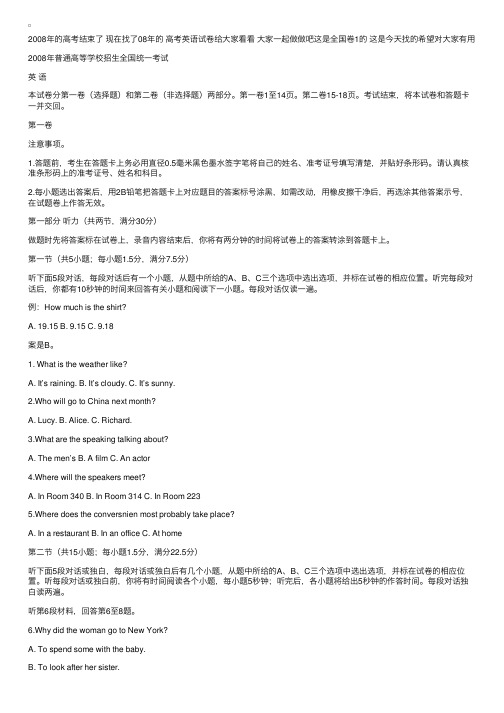
2008年的⾼考结束了现在找了08年的⾼考英语试卷给⼤家看看⼤家⼀起做做吧这是全国卷1的这是今天找的希望对⼤家有⽤2008年普通⾼等学校招⽣全国统⼀考试英语本试卷分第⼀卷(选择题)和第⼆卷(⾮选择题)两部分。
第⼀卷1⾄14页。
第⼆卷15-18页。
考试结束,将本试卷和答题卡⼀并交回。
第⼀卷注意事项。
1.答题前,考⽣在答题卡上务必⽤直径0.5毫⽶⿊⾊墨⽔签字笔将⾃⼰的姓名、准考证号填写清楚,并贴好条形码。
请认真核准条形码上的准考证号、姓名和科⽬。
2.每⼩题选出答案后,⽤2B铅笔把答题卡上对应题⽬的答案标号涂⿊,如需改动,⽤橡⽪擦⼲净后,再选涂其他答案⽰号,在试题卷上作答⽆效。
第⼀部分听⼒(共两节,满分30分)做题时先将答案标在试卷上,录⾳内容结束后,你将有两分钟的时间将试卷上的答案转涂到答题卡上。
第⼀节(共5⼩题;每⼩题1.5分,满分7.5分)听下⾯5段对话,每段对话后有⼀个⼩题,从题中所给的A、B、C三个选项中选出选项,并标在试卷的相应位置。
听完每段对话后,你都有10秒钟的时间来回答有关⼩题和阅读下⼀⼩题。
每段对话仅读⼀遍。
例:How much is the shirt?A. 19.15B. 9.15C. 9.18案是B。
1. What is the weather like?A. It’s raining.B. It’s cloudy.C. It’s sunny.2.Who will go to China next month?A. Lucy.B. Alice.C. Richard.3.What are the speaking talking about?A. The men’sB. A filmC. An actor4.Where will the speakers meet?A. In Room 340B. In Room 314C. In Room 2235.Where does the conversnien most probably take place?A. In a restaurantB. In an officeC. At home第⼆节(共15⼩题;每⼩题1.5分,满分22.5分)听下⾯5段对话或独⽩,每段对话或独⽩后有⼏个⼩题,从题中所给的A、B、C三个选项中选出选项,并标在试卷的相应位置。
2008年普通高等学校招生全国统一考试英语试卷及答案-福建卷

2008年普通高等学校招生全国统一考试英语第I卷(选择题共115分)第一部分听力(共两节,满分30分)做题时,先将答案标在试卷上。
录音内容结束后,你将有两分钟的时间将试卷上的答案转涂到答题卡上。
第一节(共5小题;每小题1.5分,满分7.5分)听下面5段对话。
第段对话后有一个小题,从题中所给的A、B、C三个选项中选出最佳选项,并标在试卷的相应位置。
听完每段对话后,你都有10秒钟的时间来回答有关小题和阅读下一小题。
每段对话仅读一遍。
例:How much is the shirt?A.£ 19.15B. £ 9.15C. £ 9.18答案是B。
1.What is the weather like?A. It’s raining.B.It’s cloudy.C.It’s sunny.2.Who will go to China next month?A. Lucy.B. Alice.C. Richard.3.What are the speakers talking about?A. The man’s sister.B.A film.C. An actor.4.Where will the speakers meet?A. In Room 340.B. In Room 314.C. In Room 223.5.Where does the conversation most probably take place?A. In a restaurant.B. In an office.C. At home.第二节(共15小题;每小题1.5分,满分22.5分)听下面5段对话或独白。
每段对话或独白后有几个小题,从题中所给的A、B、C三个选项中选出最佳选项,并标在试卷的相应位置。
听每段对话或独白前,你将有时间阅读各个小题,每小题5秒种,各小题将给出5秒种的作答时间。
每段对话或独白读两遍。
2008年全国统一高考英语试卷(全国卷Ⅰ)(含解析版)
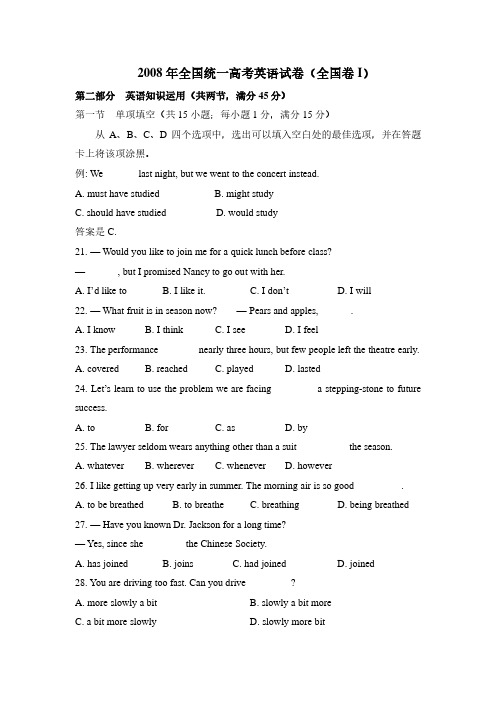
2008年全国统一高考英语试卷(全国卷I)第二部分英语知识运用(共两节,满分45分)第一节单项填空(共15小题;每小题1分,满分15分)从A、B、C、D四个选项中,选出可以填入空白处的最佳选项,并在答题卡上将该项涂黑。
例: We ______ last night, but we went to the concert instead.A. must have studiedB. might studyC. should have studiedD. would study答案是C.21. — Would you like to join me for a quick lunch before class?— ______, but I promised Nancy to go out with her.A. I’d like toB. I like it.C. I don’tD. I will22. — What fruit is in season now? — Pears and apples, ______.A. I knowB. I thinkC. I seeD. I feel23. The performance _______ nearly three hours, but few people left the theatre early.A. coveredB. reachedC. playedD. lasted24. Let’s learn to use the problem we are facing ________ a stepping-stone to future success.A. toB. forC. asD. by25. The lawyer seldom wears anything other than a suit __________the season.A. whateverB. whereverC. wheneverD. however26. I like getting up very early in summer. The morning air is so good _________.A. to be breathedB. to breatheC. breathingD. being breathed27. — Have you known Dr. Jackson for a long time?— Yes, since she________ the Chinese Society.A. has joinedB. joinsC. had joinedD. joined28. You are driving too fast. Can you drive_________?A. more slowly a bitB. slowly a bit moreC. a bit more slowlyD. slowly more bit29. The wet weather will continue tomorrow when a cold front ______ to arrive.A. is expectedB. is expectingC. expectsD. will be expected30. — Which of the two computer games did you prefer?— Actually I didn’t like ______.A. both of themB. either of themC. none of themD. neither of them31. — Have you got any idea for the summer vacation?— I don’t mind where we go ______ there’s sun, sea and beach.A. as ifB. as long asC. now thatD. in order that32. The weather was ______ cold that I didn’t like to leave my room.A. reallyB. suchC. tooD. so33. The English spoken in the United States is only slightly different from ______ spoken in England.A. whichB. whatC. thatD. the one34. After studying in a medical college for five years, Jane ______ her job as a doctor in the countryside.A. set outB. took overC. took upD. set up35. — Sorry, I made a mistake again. — ______. Practice more and you’ll succeed.A. Never mindB. Certainly notC. Not at allD. Don’t mention it第二节完形填空(共20小题,每题1.5分,共30分)阅读下面短文,撑握其大意,然后从36—55各题所给的四个选项(A、B、C和D)中,选出最佳选项,并在答题卡上将该项涂黑。
2008年高考试题与答案(全国卷2英语)
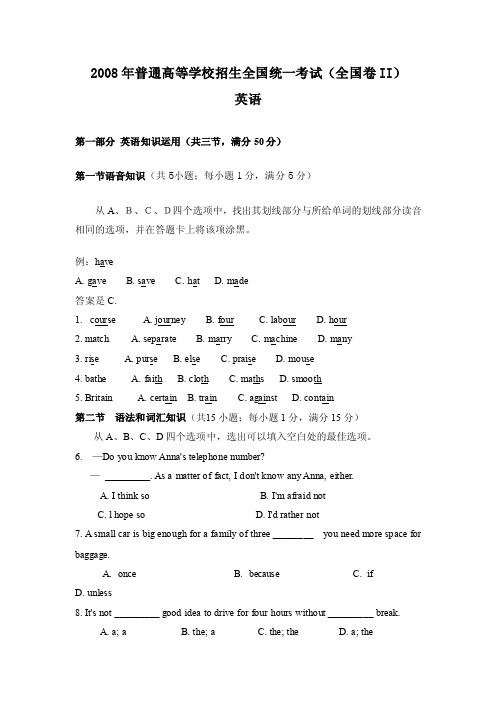
2008年普通高等学校招生全国统一考试(全国卷II)英语第一部分英语知识运用(共三节,满分50分)第一节语音知识(共5小题;每小题1分,满分5分)从A、B、C、D四个选项中,找出其划线部分与所给单词的划线部分读音相同的选项,并在答题卡上将该项涂黑。
例:ha veA. gaveB. sav eC. ha tD. mad e答案是C.1.co urse A. journey B. fou r C. l abour D. hour2.match A. separat e B. ma rry C.machine D. many3. rise A. purse B. else C. prai se D. m ouse4. ba the A. faith B. cloth C. maths D. smoot h5. Brita in A.certain B. train C. agains t D. con tain第二节语法和词汇知识(共15小题;每小题1分,满分15分)从A、B、C、D四个选项中,选出可以填入空白处的最佳选项。
6.—Do you k now Anna's telephone number?—_________. As amatter offact, I do n't know a ny Anna, e ither. A. I thi nk so B.I'm afraid notC. l hopeso D. I'd rather no t7. A sma ll car isbig enough for a fam ily of thr ee ________ you nee d more spa ce for bag gage. A. once B. bec ause C. i f D. unless8. It's not_________good ideato drive f or four ho urs withou t _________ break. A. a;a B. the;a C. the; th e D. a; the9.—What a re you rea ding, Tom?—I'm no t really r eading, ju st _________ the pag es.A. turningoff B. turningaround C. turningover D. turningup 10.—Co uld I askyou a rath er persona l question ?—Sur e, .A. pardon m e B. go ahead C.good idea D. forge t it11.If the wea ther had b een better , we coul d have had a picnic. But it al lday . A. rain ed B. rains C. hasrained D. is raini ng12. Th e director had her a ssistant s ome hot do gs for the meeting .A. p icked up B. pick s upC.pick up D. picki ng up13. Stand ove r there you‘ll be abl e to see t he oil pai nting bett er .A. but B. t ill C. and D. or14. If t heir marke ting plans succeed , they the ir sales b y 20 perce nt .A. will in crease B. have bee n increasi ng C. hav e increase d D. wo uld be inc reasing15. Modem e quipment a nd no smok ing are tw o of the t hings I li ke _______ working h ere.A. with B.over C. at D. about16. The road condition s there tu rned out t o be verygood, ______ was mor e than wecould expe ct.A. it B.what C. which D. that17. Liza wel l not want to go onthe trip –she hatestraveling.A.will B. can C. mustD. ma y18. Lit tle Johnny felt thebag, curio us to know what it_________. A. col lected B. con tained C. l oaded D. saved19. The house still nee ded a lotof work, b ut __________ the ki tchen wasfinished.A. in stead B. alto gether C. at on ce D. at leas t20. It w as in NewZealand __________ E lizabeth f irst met M r. Smith.A. th at B. howC. whi ch D. w hen第三节完型填空(共20小题;每小题1.5分,满分30分)阅读下面短文,掌握其大意,然后从21—40各题所给的四个选项(A、B、C、D)中,选出最佳选项。
08年全国英语高考试卷
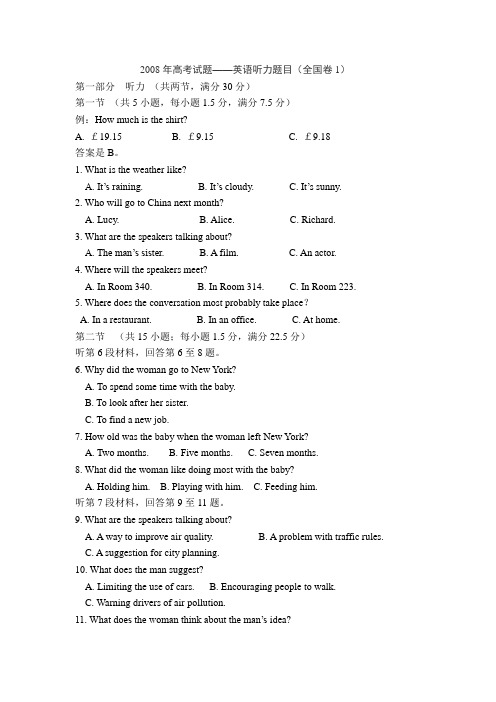
2008年高考试题——英语听力题目(全国卷1)第一部分听力(共两节,满分30分)第一节(共5小题,每小题1.5分,满分7.5分)例:How much is the shirt?A. £19.15B. £9.15C. £9.18答案是B。
1. What is the weather like?A. It’s raining.B. It’s cloudy.C. It’s sunny.2. Who will go to China next month?A. Lucy.B. Alice.C. Richard.3. What are the speakers talking about?A. The man’s sister.B. A film.C. An actor.4. Where will the speakers meet?A. In Room 340.B. In Room 314.C. In Room 223.5. Where does the conversation most probably take place?A. In a restaurant.B. In an office.C. At home.第二节(共15小题;每小题1.5分,满分22.5分)听第6段材料,回答第6至8题。
6. Why did the woman go to New York?A. To spend some time with the baby.B. To look after her sister.C. To find a new job.7. How old was the baby when the woman left New York?A. Two months.B. Five months.C. Seven months.8. What did the woman like doing most with the baby?A. Holding him.B. Playing with him.C. Feeding him.听第7段材料,回答第9至11题。
2008年高考英语试卷(全国卷ii)(含部分解析)
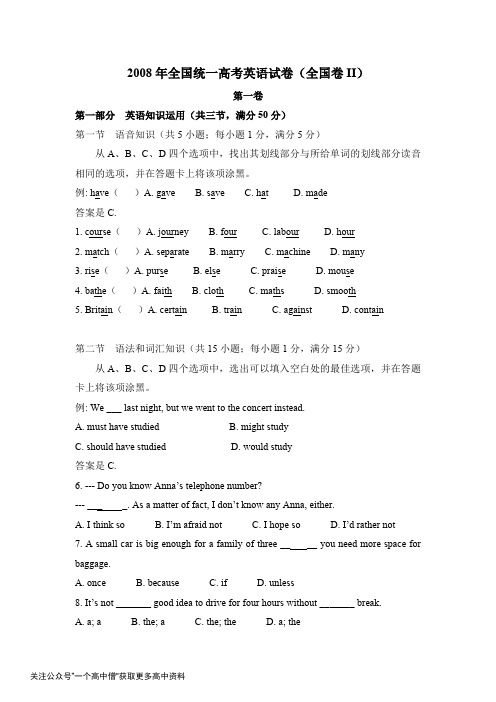
2008年全国统一高考英语试卷(全国卷II)第一卷第一部分英语知识运用(共三节,满分50分)第一节语音知识(共5小题;每小题1分,满分5分)从A、B、C、D四个选项中,找出其划线部分与所给单词的划线部分读音相同的选项,并在答题卡上将该项涂黑。
例: have()A. gave B. save C. hat D. made答案是C.1. course()A. journey B. four C. labour D. hour2. match()A. separate B. marry C. machine D. many3. rise()A. purse B. else C. praise D. mouse4. bathe()A. faith B. cloth C. maths D. smooth5. Britain()A. certain B. train C. against D. contain第二节语法和词汇知识(共15小题;每小题1分,满分15分)从A、B、C、D四个选项中,选出可以填入空白处的最佳选项,并在答题卡上将该项涂黑。
例: We ___ last night, but we went to the concert instead.A. must have studiedB. might studyC. should have studiedD. would study答案是C.6. --- Do you know Anna’s telephone number?--- ___ _. As a matter of fact, I don’t know any Anna, either.A. I think soB. I’m afraid notC. I hope soD. I’d rather not7. A small car is big enough for a family of three __ __ you need more space for baggage.A. onceB. becauseC. ifD. unless8. It’s not __ __ good idea to drive for four hours without __ __ break.A. a; aB. the; aC. the; theD. a; the9. --- What are you reading, Tom?--- I’m not really reading, just __ __ the pages.A. turning offB. turning aroundC. turning overD. turning up10. --- Could I ask you a rather personal question?--- Sure, ____.A. pardon meB. go aheadC. good ideaD. forget it11. If the weather had been better, we could have had a picnic. But it ____ all day.A. rainedB. rainsC. has rainedD. is raining12. The director had her assistant ___ some hot dogs for the meeting.A. picked upB. picks upC. pick upD. picking up13. Stand over there ___ you’ll be able to see the oil painting better.A. butB. tillC. andD. or14. If their marketing plans succeed, they ____ their sales by 20 percent.A. will increaseB. have been increasingC. have increasedD. would be increasing15. Modern equipment and no smoking are two of the things I like ____ working here.A. withB. overC. atD. about16. The road conditions there turned out to be very good, ___ was more than we could expect.A. itB. whatC. whichD. that17. Liza ___ well not want to go on the trip --- she hates traveling.A. willB. canC. mustD. may18. Little Johnny felt the bag, curious to know what it ____.A. collectedB. containedC. loadedD. saved19. The house still needed a lot of work, but ___ the kitchen was finished.A. insteadB. altogetherC. at onceD. at least20. It was in New Zealand ___ Elizabeth first met Mr. Smith.A. thatB. howC. whichD. when第三节完形填空(共20小题;每小题1.5分,满分30分)阅读下面短文,从短文后各题所给的四个选项(A、B、C和D)中,选出可以填入空白处的最佳选项,并在答题卡上将该选项涂黑。
2008年全国高考2卷理科英语试题及答案
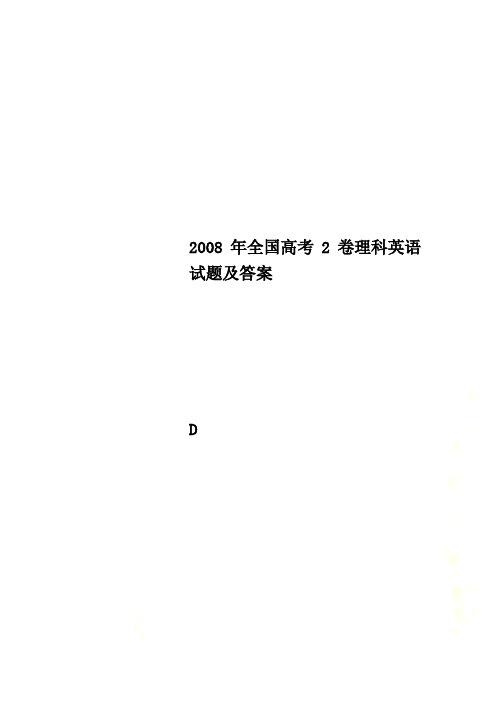
2008年全国高考2卷理科英语试题及答案D4. batheA. faithB. clothC. mathsD. smooth5. BritainA. certainB. trainC. againstD. contain第二节语法和词汇知识(共15小题;每小题1分,满分15分)从A、B、C、D四个选项中,选出可以填入空白处的最佳选项,并在答题卡上将该项涂黑。
例:We ___ last night, but we went to the concert instead.A. must have studiedB. might studyC. should have studiedD. would study答案是C。
6. –Do you know Anna’s telephone number?-- ____. As a matter of fact, I don’t know any Anna, either.A. I think soB. I’m afraid notC. I hope soD. I’d rather not7. A small car is big enough for a family of three____ you need more space for baggage.A. onceB. becauseC. ifD. unless8. It’s not ___ good idea to drive for four hours without ___ break.A. a ; aB. the ; aC. the ; theD. a ; the9. – What are you reading, Tom?–I’m not really reading, just ___ the pages.A. turning offB. turning aroundC. turning overD. turning up10. -- Could I ask you a rather personal question?-- Sure, ____.A. pardon meB. go aheadC. good ideaD. forget it11. If the weather had been better, we could have had a picnic. But it ____ all day.A. rainedB. rainsC. has rainedD. is raining12. The director had her assistant ___ some hot dogs for the meeting.A. picked upB. picks upC. pick upD. picking up13. Stand over there ___ you’ll be able to see the oilpainting better.A. butB. tillC. andD. or14. If their marketing plans succeed, they ____ their sales by 20 percent.A. will increaseB. have been increasingC. have increasedD. would be increasing15. Modern equipment and no smoking are two of the things I like ____ working here.A. withB. overC. atD. about16. The road conditions there turned out to be very good, ___ was more than we could expect.A. itB. whatC. whichD. that17. Liza ___ well not want to go on the trip --- she hates traveling.A. willB. canC. mustD. may18. Little Johnny felt the bag, curious to know what it ____.A. collectedB. containedC. loadedD. saved19. The house still needed a lot of work, but ___ the kitchen was finished.A. insteadB. altogetherC. at onceD. atleast20. It was in New Zealand ___ Elizabeth first met Mr. Smith.A. thatB. howC. whichD. when第三节完形填空(共20小题;每小题1.5分,满分30分)阅读下面短文,从短文后各题所给的四个选项(A、B、C和D)中,选出可以填入空白处的最佳选项,并在答题卡上将该选项涂黑。
2008年全国统一高考英语试卷听力+原文+答案(全国卷Ⅰ、Ⅱ)
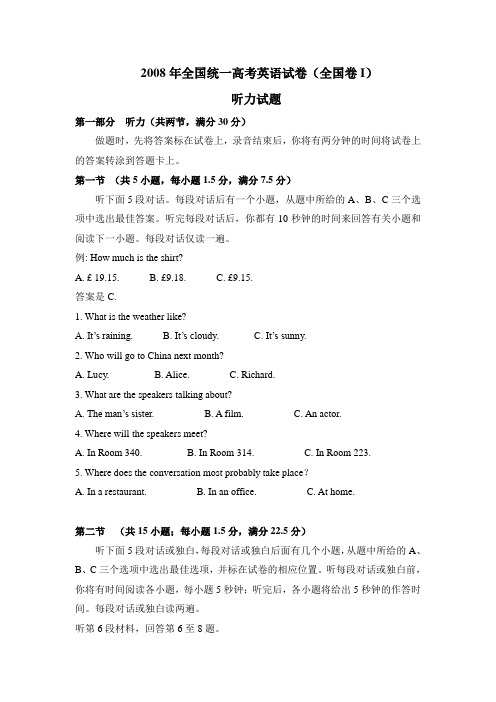
2008年全国统一高考英语试卷(全国卷I)听力试题第一部分听力(共两节,满分30分)做题时,先将答案标在试卷上,录音结束后,你将有两分钟的时间将试卷上的答案转涂到答题卡上。
第一节(共5小题,每小题1.5分,满分7.5分)听下面5段对话。
每段对话后有一个小题,从题中所给的A、B、C三个选项中选出最佳答案。
听完每段对话后,你都有10秒钟的时间来回答有关小题和阅读下一小题。
每段对话仅读一遍。
例: How much is the shirt?A. £ 19.15.B. £9.18.C. £9.15.答案是C.1. What is the weather like?A. It’s raining.B. It’s cloudy.C. It’s sunny.2. Who will go to China next month?A. Lucy.B. Alice.C. Richard.3. What are the speakers talking about?A. The man’s sister.B. A film.C. An actor.4. Where will the speakers meet?A. In Room 340.B. In Room 314.C. In Room 223.5. Where does the conversation most probably take place?A. In a restaurant.B. In an office.C. At home.第二节(共15小题;每小题1.5分,满分22.5分)听下面5段对话或独白,每段对话或独白后面有几个小题,从题中所给的A、B、C三个选项中选出最佳选项,并标在试卷的相应位置。
听每段对话或独白前,你将有时间阅读各小题,每小题5秒钟;听完后,各小题将给出5秒钟的作答时间。
每段对话或独白读两遍。
听第6段材料,回答第6至8题。
2008年全国各地高考英语阅读理解题汇总
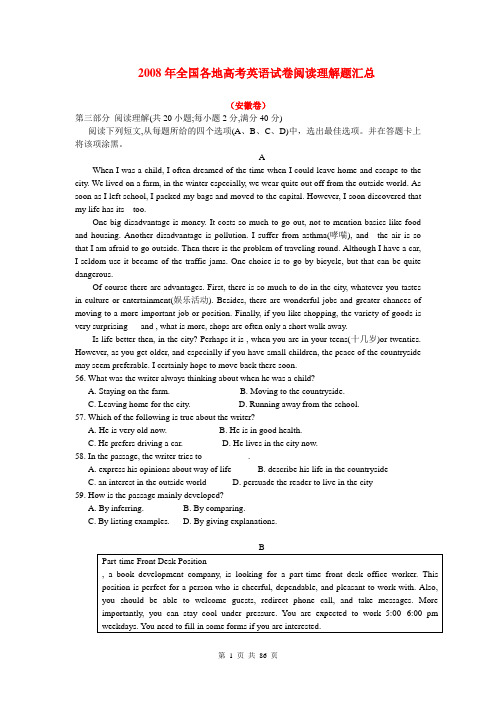
2008年全国各地高考英语试卷阅读理解题汇总(安徽卷)第三部分阅读理解(共20小题;每小题2分,满分40分)阅读下列短文,从每题所给的四个选项(A、B、C、D)中,选出最佳选项。
并在答题卡上将该项涂黑。
AWhen I was a child, I often dreamed of the time when I could leave home and escape to the city. We lived on a farm, in the winter especially, we wear quite out off from the outside world. As soon as I left school, I packed my bags and moved to the capital. However, I soon discovered that my life has its too.One big disadvantage is money. It costs so much to go out, not to mention basics like food and housing. Another disadvantage is pollution. I suffer from asthma(哮喘), and the air is so that I am afraid to go outside. Then there is the problem of traveling round. Although I have a car, I seldom use it became of the traffic jams. One choice is to go by bicycle, but that can be quite dangerous.Of course there are advantages. First, there is so much to do in the city, whatever you tastes in culture or entertainment(娱乐活动). Besides, there are wonderful jobs and greater chances of moving to a more important job or position. Finally, if you like shopping, the variety of goods is very surprising --- and , what is more, shops are often only a short walk away.Is life better then, in the city? Perhaps it is , when you are in your teens(十几岁)or twenties. However, as you get older, and especially if you have small children, the peace of the countryside may seem preferable. I certainly hope to move back there soon.56. What was the writer always thinking about when he was a child?A. Staying on the farm.B. Moving to the countryside.C. Leaving home for the city.D. Running away from the school.57. Which of the following is true about the writer?A. He is very old now.B. He is in good health.C. He prefers driving a car.D. He lives in the city now.58. In the passage, the writer tries to __________.A. express his opinions about way of lifeB. describe his life in the countrysideC. an interest in the outside worldD. persuade the reader to live in the city59. How is the passage mainly developed?A. By inferring.B. By comparing.C. By listing examples.D. By giving explanations.A. B. Atlantic City Beach Office.C. 368 Cooper Square, New York, NYD. 866 United, New York, NY 10017.61. What does a person need most to be the one-hour weekday job?A. He should he cheerful, dependable, and easy-going.B. He has to work from Monday to Friday.C. He can remain calm in a difficult situation.D. He can welcome guests and deal with phone calls.62. According to the above information, what is the right thing to do when you?A. To keep close to the beach.B. To dive into unknown waters.C. To use floating toys on the water.D. To swim soon after lunch.63. The best title for the last piece of information would be_________.A. Tips on Showing Interest in a JobB. Stops to a Successful InterviewC. Advice on Introducing Yourself PolitelyD. of Body Language in an InterviewCPeople believes that climbing can do good to health. Where can you learn the skill ofclimbing then? If you think that you have to go to the mountains to learn how to climb, you’re wrong. Many Americans are learning to climb in city gyms(体育馆). Here, people are learning on climbing. The climbing wall goes straight up and small holding places for hands and feet.How do people climb the wall? To climb, you need special shoes and (保护带) around your chest to hold you. There are ropes(绳索)tied to your. The ropes hold you in place so that you don’t fall. A beginner’s wall is usually about 15 feet high, and you climb straight up. There are small pieces of metal that stick out for you to stand on and hold on to. Sometimes it’s easy to see the new piece of metal. Sometimes, it’s not. The most difficult is an your fear. It’s normal for humans to be afraid of falling, so it’s difficult not to feel fear. But when you move away from the wall, the and the ropes hold you, and you begin to feel safe. You move slowly until you reach the top.Climbing attracts people because it’s good exercise for almost everyone. You use your whole body, especially your arms and legs. This sport gives your body a complete workout. When you climb, both your mind and your body can become stronger.64. What can we infer from the passage?A. People are fairly interested in climbing nowadays.B. It is impossible to build up one’s body by climbing.C. People can only learn the skill of climbing outdoors.D. It is always easy to see holding places in climbing.65. The most difficult thing to do in wall climbing is _______.A. to tie ropes to yourB. to control your fearC. to move away from the wallD. to climb straight up66. The word “workout” underlined in the last paragraph most probably means _________.A. settlementB. exerciseC. excitementD. tiredness67. Why does the author write this passage?A. To tell people where to find gyms.B. To prove the basic need for climbingC. To encourage people to climb mountains.D. introduce the sport of wall climbingDSome people think that as more and more people have televisions in their homes, fewer and fewer people will buy books and newspapers. Why read an article in the newspaper, when the TV news can bring you the information in a few minutes and with pictures? Why read the life story of a famous man, when a short television program can tell you all that you want to know?Television has not killed reading, however. Today, newspapers sell in very large numbers. And books of every kind are sold more than ever before. Books are still a cheap way to get information and enjoyment. Although some books with hard covers are expensive, many books are printed today as paperbooks (平装本), which are quite cheap. A paperback collection of short stories, for example, is always cheaper than an evening at the cinema or the theater, and you can keep a book for ever and read it many times.Books are a wonderful provider of knowledge and pleasure and some types of books should be in every home. Every home should have a good dictionary. A good encyclopedia (百科全书), though expensive, is useful, too, because you can find information on any subject. Besides, you can have such books as history books., science textbook, cookbooks, and collections of stories and poems. Then from time to time you can take a book of poems off your shelves and read the thoughts and feelings of your favorite poets.68. It can be inferred from the passage that ________.A. TV programs are a chief provider of knowledgeB. cinemas are the best choice in getting informationC. reading is a cheap way of learning and having funD. newspapers are an expensive way to enjoy oneself69. What does the sentences “Television has not killed reading, however ”underlined in the second paragraph suggest?A. People only need reading, though.B. Reading is still necessary today.C. Reading is more fun than television.D. Watching television doesn’t help reading.70. What can we learn from the passage?A. Fewer and fewer people will buy books.B. A good dictionary should be kept in every home.C. Books with hard covers sell better than paperbooks.D. More people like TV programs about famous men.EThe small number of newborn babies, which has been caused by high prices and the changing social situation of women, is one of the most serious problems in Asia. When people talk about it, you can hear a word invented in Japan. which means Double Income Kids(小孩).In many major Asian cities like Seoul, Singapore, and Tokyo, the cost of a ****** is extremely high. A young couple who want to buy their own house may have to pay about $3000,000 (though prices have fallen). For a flat with one bedrooms, one dining-room, a kitchen, and a bathroom, the couple will pay about $900 a month. What’s more, if they want to have a child, the child’s education is very expensive. For example, most kindergarten charges are at least $5.000 a year. In such a situation, it’s difficult to afford children.The number of married women who want to continue working because they enjoy their jobs. However, if they want to have children, they immediately have serious problems. Though most companies allow women to leave their jobs for a short time to have a baby, they expect women with babies to give up their jobs. In short, if they want to bring up children properly, both parents have to work, but it is hard for mothers to work. Indeed, women who want to contimue working have to choose between having children or keeping their jobs.In a word, Asian governments must take steps to improve the present situation as soon as possible.72. What is the main problem being discussed in the passage?A. The small number of newborn babies.B. The changing social situation of women.C. The high prices of houses and education.D. The necessary steps of Asian government.73. According to the passage, which of the following is true?A. It is easy for a couple to afford a child in Asia.B. The prices of in Asia are quite low now.C. Fewer and fewer married women wan to have a job.D. The word “DINKS” appeared in an Asian country.74. To buy a flat and send a child to kindergarten, how much will a couple pay each year?A. 85,000B. 85,900C. $10.800D. $15.80075. The seems to believe that Asian governments should ________.A. let women stay at home and have a babyB. allow one of the parents to go out to workC. care for the growing needs of women for job.D. the companies that permit women to leave.答案:第三部分:56.C 57.D 58.A 59.B 60.D 61.C 62.A 63.B 64.A 65.B 66.B 67.D68.C 69.B 70.A 71.B 72.A 73.D 74.D 75C(北京卷)第三部分:阅读理解(共20小题;每小题2分,满分40分)阅读下列短文,从每篇短文后所给各题的四个选项(A、B、C和D)中,选出最佳选项,并在答题卡上将该项涂黑。
#2008年高考英语试题及答案
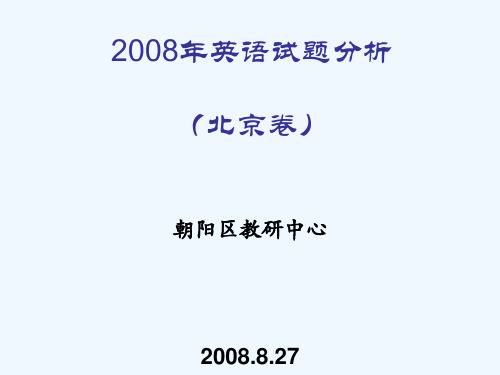
也在考查学生观察、分析、判断、综合、记忆、推理 和想象的能力以及全面文化知识的水平。08年的完形 填空讲一个人的学习经历,老师的严格要求使他最终 成功。考生之所以普遍反映比较难,其原因是这篇短 文只有结合上下文的具体情况,经过仔细观察和分析, 才可能判断准确。所设20个小题中半数需要考生逾越 句子,联系上下文去理解和推断。同时要求考生对意 思、用法相近的词进行辨析,选出最佳答案。
考的仍是基础知识和基本技能。基础的东西掌握好了, 才可能把试卷中的中低档题做对,也才有可能攻克由 诸项基础知识综合而成的难题。高考成绩的高低,主 要取决于基础知识和基本技能的掌握,也可以说取决 于中低档题的成功率。那种在总复习中一味追求难题、 怪题,而忽视基础知识的落实与基本技能训练的作法, 实在是与高考命题的主导思想背道而弛。
综合分析08年试题,主要有以下几个特点:
一、整个试卷强调英语在实际生活中的运用 无论听力,单选、阅读和写作等各个题型的考试都
能贴近生活,贴近实际。也就是说,只有会在具体的 语境下灵活使用英语,具有良好的语感和使用经验, 才能在考试中取得好成绩。如果只知道一些语法知识 的细枝末节,而听说读写都没怎么练,那在高考中肯 定是英雄无用武之地,分数上不去。这个特点对引导 我们在教学应注重学生实际使用英语能力的培养会起 重要的作用。
西藏高考考试题目及答案
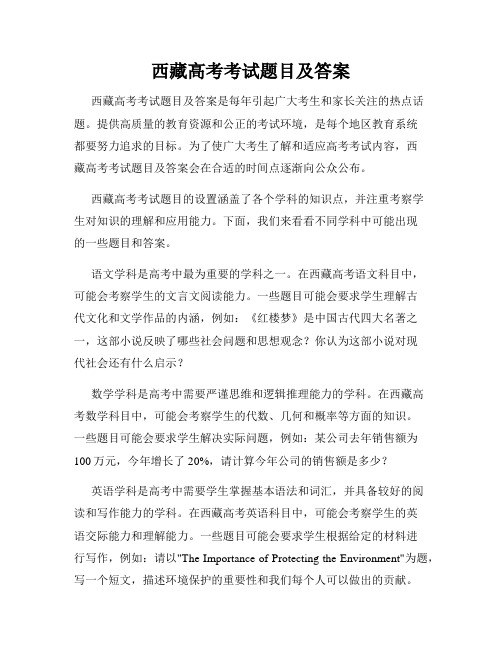
西藏高考考试题目及答案西藏高考考试题目及答案是每年引起广大考生和家长关注的热点话题。
提供高质量的教育资源和公正的考试环境,是每个地区教育系统都要努力追求的目标。
为了使广大考生了解和适应高考考试内容,西藏高考考试题目及答案会在合适的时间点逐渐向公众公布。
西藏高考考试题目的设置涵盖了各个学科的知识点,并注重考察学生对知识的理解和应用能力。
下面,我们来看看不同学科中可能出现的一些题目和答案。
语文学科是高考中最为重要的学科之一。
在西藏高考语文科目中,可能会考察学生的文言文阅读能力。
一些题目可能会要求学生理解古代文化和文学作品的内涵,例如:《红楼梦》是中国古代四大名著之一,这部小说反映了哪些社会问题和思想观念?你认为这部小说对现代社会还有什么启示?数学学科是高考中需要严谨思维和逻辑推理能力的学科。
在西藏高考数学科目中,可能会考察学生的代数、几何和概率等方面的知识。
一些题目可能会要求学生解决实际问题,例如:某公司去年销售额为100万元,今年增长了20%,请计算今年公司的销售额是多少?英语学科是高考中需要学生掌握基本语法和词汇,并具备较好的阅读和写作能力的学科。
在西藏高考英语科目中,可能会考察学生的英语交际能力和理解能力。
一些题目可能会要求学生根据给定的材料进行写作,例如:请以"The Importance of Protecting the Environment"为题,写一个短文,描述环境保护的重要性和我们每个人可以做出的贡献。
物理学科是高考中需要学生理解物质的本质和自然法则,并运用科学知识解决实际问题的学科。
在西藏高考物理科目中,可能会考察学生对物理概念的理解和实验分析能力。
一些题目可能会要求学生应用知识解决实际问题,例如:小明用手掂了一下一本书的重量,感觉非常重。
请解释这种感觉是如何产生的,并对这种感觉做出科学解释。
化学学科是高考中需要学生理解物质结构和化学反应过程的学科。
在西藏高考化学科目中,可能会考察学生对化学知识的认识和实验操作能力。
2008年高考英语试题及答案
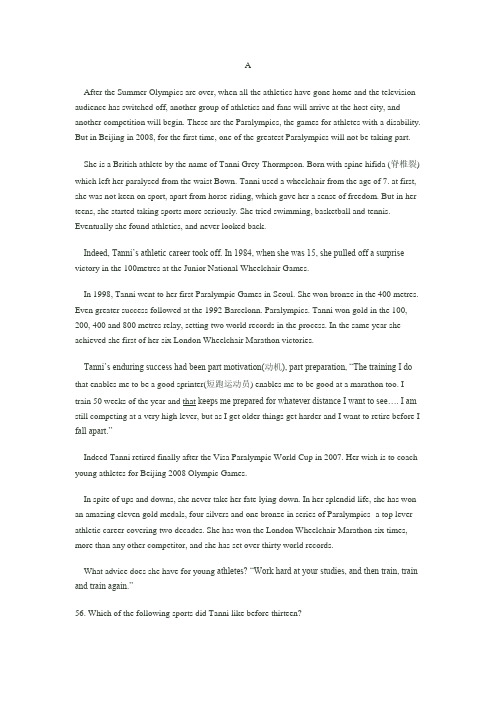
AAfter the Summer Olympics are over, when all the athletics have gone home and the television audience has switched off, another group of athletics and fans will arrive at the host city, and another competition will begin. These are the Paralympics, the games for athletes with a disability. But in Beijing in 2008, for the first time, one of the greatest Paralympics will not be taking part.She is a British athlete by the name of Tanni Grey-Thormpson. Born with spine hifida (脊椎裂) which left her paralysed from the waist Bown. Tanni used a wheelchair from the age of 7. at first, she was not keen on sport, apart from horse-riding, which gave her a sense of freedom. But in her teens, she started taking sports more seriously. She tried swimming, basketball and tennis. Eventually she found athletics, and never looked back.Indeed, Tanni’s athletic career took off. In 1984, when she was 15, she pulled off a surprise victory in the 100metres at the Junior National Wheelchair Games.In 1998, Tanni went to her first Paralympic Games in Seoul. She won bronze in the 400 metres. Even greater success followed at the 1992 Barcelonn. Paralympics. Tanni won gold in the 100, 200, 400 and 800 metres relay, setting two world records in the process. In the same year she achieved she first of her six London Wheelchair Marathon victories.Tanni’s enduring success had been part motivation(动机), part preparation, “The training I do that enables me to be a good sprinter(短跑运动员) enables me to be good at a marathon too. I train 50 weeks of the year and that keeps me prepared for whatever distance I want to see…. I am still competing at a very high lever, but as I get older things get harder and I want to retire before I fall apart.”Indeed Tanni retired finally after the Visa Paralympic World Cup in 2007. Her wish is to coach young athletes for Beijing 2008 Olympic Games.In spite of ups and downs, she never take her fate lying down. In her splendid life, she has won an amazing eleven gold medals, four silvers and one bronze in series of Paralympics- a top lever athletic career covering two decades. She has won the London Wheelchair Marathon six times, more than any other competitor, and she has set over thirty world records.What advice does she have for young athletes? “Work hard at your studies, and then train, train and train again.”56. Which of the following sports did Tanni like before thirteen?A. BasketballB. Swimming.C. Tennis.D. Horse-riding.57. When did Tanni win her first Olympic gold medal?A. In 1984.B. In 1988.C. In 1992.D. In 2007.58. The underlined word “that” in the 5th paragraph refers to _______.A. fifty weeks’ trainingB. being a good sprinterC. training almost every dayD. part motivation and part preparation59. What’s the right order of the events related to Tanni?a. She works as a coach.b. She took up athletics.c. She won four gold medals in Barcelong.d. She competed in her first Paralympic Games.e. She achieved a victory in her first London Wheelchair Marathon.A. b, d, c, e aB. a, d, b, c ,eC. A,d,c,e,bD. b.d.a.e.c60. What can we learn from Tanni’s success?A. Union is strength.B. Never too late to learn.C. Well begun is half done.D. No pains, no gains.BFor years we have been told that encouraging a child’s self-respect is important to his or her success is life. But child experts are now learning that too much praise can lead to the opposite effect. Praise-sholic kids who expect it at every turn may become teens who seek to same kind of approval from friends when asked if they want to go in the backscat of the car.The implication(含义) of saying “You are the prettiest girl in class,” or talking about the goals she succeed but not her overall effort, is that you love her only when she looks the best, some she highest, achieves the most. And this carries over to the classroom.Social psychologist Carrol Dweck, PhD, tested the effects of overpraise on 400fifth graders while she was at Columbia University. She found that kids praised for “trying hard” did better on testes and were more likely to take on difficult assignments than those praised for being “smart”.“Praising attributes(品质) or abilities makes a false promise that success will come to you because yo u have that quality, and it devalues effort, so children are afraid to take on challenges, ” says Dweck, now at Stanford University, “They figure they’s better quit while they’re ahead.”61. The underlined words “Praise-sholic kids” refers to kids who are ______.A. tired of being praisedB. worthy of being praisedC. very proud of being praisedD. extremely fond of being praised62. The author quoted(引用) Dr. Dweck’s words in the last paragraph in order to make the article _____.A. better-knownB. better-organizedC. more percussiveD. more interesting63. We can infer from the passage that _____.A. praise for efforts should be more encouragedB. praise for results works better than praise for effortsC. praisi ng a child’s achievements benefits his or her success in lifeD. praising a child’s abilities encourage him or her to take on challengesCWe have designed all our bank cards to make your life easier.How to use your NatWest ServicecardAs a Switch card, it lets you pay for all sports of goods and services, whenever you see the Switch logo. The money comes straight out of your account, so you can spend as much ad you like as long as you have enough money (or an agreed overdraft(透支) to cover it. It is also a cheque guarantee(担保) card for up to the amount shown on the card. And it gives you free access to your money from over 31,000 cash machines across the UK.How to use your NatWest ChshcardYou can use your Cashcard as a Sulo card to pay for goods and server ices wherever you see the Solo logo. It can also give you access to your account and your cash from over 31,000 cash machines nationwide. You can spend or withdraw(提取) what you have in your account, or as much ar your agreed overdraft limit.Using your card abroadYou can also use your Servicecard and Cashcard when you’re abroad. You can withdraw cash at cash machines and pay for goods and services wherever you see the Cirrus or Maestro logo displayed.We take a commission charge(手续费) of 2.25% of each cash withdrawal you make (up to £4) and a commission charge of 75 pence every time you use Maestro to pay for goods or services. We also apply a foreign-exchange transaction fee of 2.62%.How to use your NatWest Credit CardWith your credit card you can do the following:*Pay for goods and services and enjoy up to 56 days’ interest-free credit.* Pay in over 24 million shops worldwide that display the Maestrocard or Visa logo.* Collect one AIR MILE for every £20 of spending that appears on your statement(结算单). (This does not include foreign currency or traveler’s cheques bought, interest and other charges.)64. If you carry the Servicecard or the Cashcard, _______.A. you can use it to guarantee things as you wishB. you can draw your money from cash machines convenientlyC. you can spend as much money as you like without a limitD. you have to pay some extra money when you pay for services in the UK65. If you withdraw £200 from a cash machine abroad, you will be charged ______.A. £4B. £4.5C. £5.25D. £5.366. Which of the following is TRUE about using your NatWest Credit Card?A. You have to pay back with interest within 56 days.B. You will be charged some interest beyond two months.C. You can use the card in any shop across the world.D. You will gain one air mile if you spend £20 on traveller’s cheques.67. The purpose of the passage is to show you how to ______.A. play your cards rightB. use your cards abroadC. draw cash with your cardsD. pay for goods with your cardsDThe global energy crisis is approaching. What ca we do? Here are some steps you can take.Cooling puts the greatest stress on your summer energy bill and the power grid(电网). Just as t tune-up for your car can improve your gas mileage, a yearly tune-up of your heating and cooling system can improve efficiency and comfort. Clean or replaces filters monthly or as needed.For central air conditioning systems and room air conditioners, look for the ENERGY STAR, the federal government’s symbol for energy efficiency. For central air, purchase the system with the highest possible Seasonal Energy Efficiency Raton. (SEER)Use energy-efficient ceiling fans either alone or with air conditioning. Ceiling fans do a great job of circulating air. When used with air conditioning, fans allow you to raise the thermostat(恒温器) and cut costs. Ceiling fans cool people, not rooms, so before you leave; turn off the ceiling fan.Let a programmable thermostat! “remember for you” to automatically adjust the indoor climate with your daily and weekend patterns to reduce cooling bills by up to 10 percent. You can come home to a comfortable house without wasting energy and cresting pollution all day while you are at work.Try to make your home airtight enough to increase your comfort, make your home quieter and cleaner and reduce your cooling costs up to 20 percent.Gut your air conditioning load, and reduce pollution by planting planting leafy trees around your home and fixing reflective bricks on your roof.Close blinds or shades on south-and west-facing windows during the day, or fix shading equipment to avoid heat build-up.Turn off everything not in use: lights, TVs, computers. And use fluorescent bulbs(荧光灯), which provide bright, warm light while using at least two-thirds less energy, producing 70 percent less heat and lasting up to 10 times longer than incandescent bulbs(白炽灯).Drive the car that gets better gas mileage whenever possible if you own more than one vehicle. If you drive 12,500 miles a year, switching 10 percent of your trips from a car that gets 20 mils per gallon to one that gets 30 mpg will save you more than £65 per year.Carpool. The average U.S. commuter(乘车上班族) could save about £260 a year by sharing cars twice a week with two people in a car that gets 20.1 mpg---assuming the three passengers share the cost of gas.68. According to the passage, the thermostat is used to .A. make rooms quieterB. control room temperatureC. turn off the air conditionerD. reduce room air pollution69. We can conclude from the passage that the author probably discourages .A. planting leafy trees around your homeB. turning off the ceiling fan before you leave your houseC. keeping your south-facing windows open during the dayD. using fluorescent bulbs instead of incandescent bulbs70. This passage is mainly about .A. energy-saving tipsB. fuel-saving tipsC. do-it-yourself tipsD. environment-protecting tipsEA new study has found no evidence that sunscreen, commonly used to reduce the risk of skin cancer, actually increase the risk.Researchers from the University of Iowa based their findings on a review of 18 earlier studies that looked at the association between sunscreen use and melanoma (黑素瘤). They said that they found flaws in studies that had reported associations between sunscreen use and higher risk of melanomaMost health experts believe that by protecting the skin from the harmful effects of the sun, sunscreen helps prevent skin cancer, which is increasing in incidence (发生率) faster than any other cancer in the United States.But questions has been raised about sunscreen and whether it may has opposite effect, perhaps by allowing people to remain exposed to the sun longer without burning.The researchers said that among the problems with some earlier studies is that they often failed to take into account that those people most at risk for skin cancer--- people with fair skin and freckles (雀斑), for example--- are more likely to use sunscreen. As a result, it may appear that sunscreen users get cancer more often.The studies, which generally relied on volunteers to recall their sunscreen use, were also unable to prove how well the products had been applied, said the new study.72. The underlined word “flaws” in the 2nd paragraph most probably means .A. evidenceB. factsC. faultsD. failures73. People with fair skin and freckles .A. seldom use sunscreenB. are more in danger of skin cancerC. can be free from the harm of the sunD. often expose themselves to the sun74. We can learn from the passage that .A. sunscreen users get skin cancer more oftenB. the volunteers have proved the effect of sunscreenC. the new study was based on the experiences of volunteersD. the number of skin cancer patients is increasing in America75. Which of the following can be the title for this passage?A. Sunscreen to Prevent Skin CancerB. Sunscreen to Increase Skin CancerC. Skin Cancer Caused by SunscreenD. Skin Cancer Caused by Freckles第二节书面表达(满分25分)阅读下面一则广告,按照要求完成写作任务。
西藏高考英语口试流程及内容
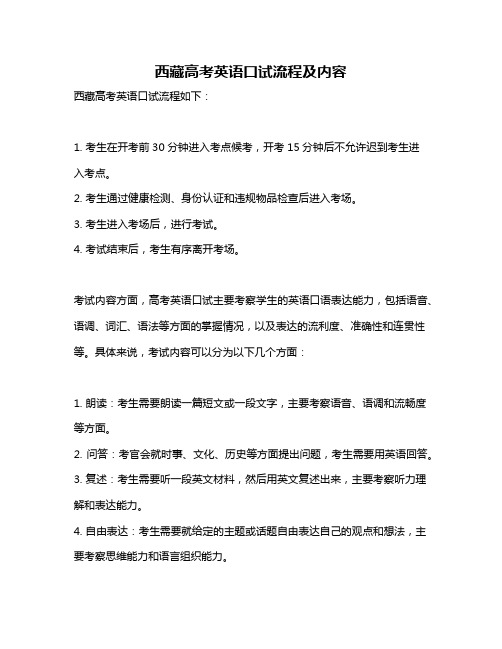
西藏高考英语口试流程及内容
西藏高考英语口试流程如下:
1. 考生在开考前30分钟进入考点候考,开考15分钟后不允许迟到考生进
入考点。
2. 考生通过健康检测、身份认证和违规物品检查后进入考场。
3. 考生进入考场后,进行考试。
4. 考试结束后,考生有序离开考场。
考试内容方面,高考英语口试主要考察学生的英语口语表达能力,包括语音、语调、词汇、语法等方面的掌握情况,以及表达的流利度、准确性和连贯性等。
具体来说,考试内容可以分为以下几个方面:
1. 朗读:考生需要朗读一篇短文或一段文字,主要考察语音、语调和流畅度等方面。
2. 问答:考官会就时事、文化、历史等方面提出问题,考生需要用英语回答。
3. 复述:考生需要听一段英文材料,然后用英文复述出来,主要考察听力理解和表达能力。
4. 自由表达:考生需要就给定的主题或话题自由表达自己的观点和想法,主要考察思维能力和语言组织能力。
需要注意的是,高考英语口试的评分标准是按照语音、语调、流利度、词汇和语法等方面来评定的,要求考生具备一定的英语口语基础和表达能力。
同时,考试时还需要注意表达的内容要符合逻辑和语境,以及避免出现过多的语言错误和停顿。
2008西藏高考英语及答案
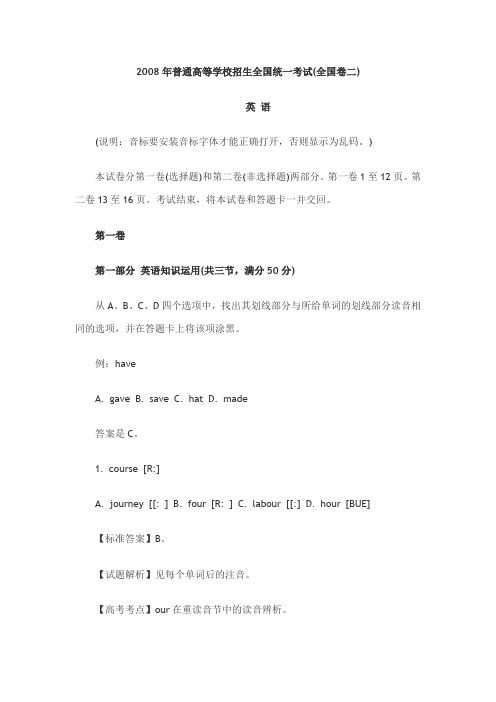
2008年普通高等学校招生全国统一考试(全国卷二)英语(说明:音标要安装音标字体才能正确打开,否则显示为乱码。
)本试卷分第一卷(选择题)和第二卷(非选择题)两部分。
第一卷1至12页。
第二卷13至16页。
考试结束,将本试卷和答题卡一并交回。
第一卷第一部分英语知识运用(共三节,满分50分)从A、B、C、D四个选项中,找出其划线部分与所给单词的划线部分读音相同的选项,并在答题卡上将该项涂黑。
例:haveA. gaveB. saveC. hatD. made答案是C。
1. course [R:]A. journey [[: ]B. four [R: ]C. labour [[:]D. hour [BUE]【标准答案】B。
【试题解析】见每个单词后的注音。
【高考考点】our在重读音节中的读音辨析。
2. match [A]A. separate [E]B. marry [A ]C. machine[E ]D. many[e] 【标准答案】B。
【试题解析】见每个单词后的注音。
【高考考点】元音字母a的读音辨析。
3. rise[z]A. purse [ s]B. else [s]C. praise [ z ]D. mouse[s]【标准答案】C。
【试题解析】见每个单词后的注音。
【高考考点】辅音字母s的读音辨析。
4. bathe [T]A. faith [W ]B. cloth [W ]C. maths[W]D. smooth [T] 【标准答案】D。
【试题解析】辅音字母组合-th的读音辨析。
【高考考点】见每个单词后的注音。
5. Britain不发音A. certain不发音B. train[ei]C. against[ei ]D. contain[ei]【标准答案】A。
【试题解析】见每个单词后的注音。
【高考考点】元音字母组合ai的读音辨析。
第二节语法和词汇知识(共15小题;每小题1分,满分15分)从A、B、C、D四个选项中,选出可以填入空白处的最佳选项,并在答题卡上将该项涂黑。
- 1、下载文档前请自行甄别文档内容的完整性,平台不提供额外的编辑、内容补充、找答案等附加服务。
- 2、"仅部分预览"的文档,不可在线预览部分如存在完整性等问题,可反馈申请退款(可完整预览的文档不适用该条件!)。
- 3、如文档侵犯您的权益,请联系客服反馈,我们会尽快为您处理(人工客服工作时间:9:00-18:30)。
2008年西藏高考英语考试及答案第一卷第一部分英语知识运用(共三节,满分50分)从A、B、C、D四个选项中,找出其划线部分与所给单词的划线部分读音相同的选项,并在答题卡上将该项涂黑。
例:haveA. gaveB. saveC. hatD. made答案是C。
1.courseA. journeyB. fourC. labourD. hour2. matchA. separateB. marryC. machineD. many3. riseA. purseB. elseC. praiseD. mouse4. batheA. faithB. clothC. mathsD. smooth5. BritainA. certainB. trainC. againstD. contain第二节语法和词汇知识(共15小题;每小题1分,满分15分)从A、B、C、D四个选项中,选出可以填入空白处的最佳选项,并在答题卡上将该项涂黑。
例:We ___ last night, but we went to the concert instead.A. must have studiedB. might studyC. should have studiedD. would study答案是C。
6. –Do you know Anna‘s telephone number?-- ____. As a matter of fact, I don‘t know any Anna, either.A. I think soB. I‘m afraid notC. I hope soD. I‘d rather not7. A small car is big enough for a family of three ____ you need more space for baggage.A. onceB. becauseC. ifD. unless8. It‘s not ___ good idea to drive for four hou rs without ___ break.A. a ; aB. the ; aC. the ; theD. a ; the9. – What are you reading, Tom?–I‘m not really reading, just ___ the pages.A. turning offB. turning aroundC. turning overD. turning up10. -- Could I ask you a rather personal question?-- Sure, ____.A. pardon meB. go aheadC. good ideaD. forget it11. If the weather had been better, we could have had a picnic. But it ____ all day.A. rainedB. rainsC. has rainedD. is raining12. The director had her assistant ___ some hot dogs for the meeting.A. picked upB. picks upC. pick upD. picking up13. Stand over there ___ you‘ll be able to see the oil painting better.A. butB. tillC. andD. or14. If their marketing plans succeed, they ____ their sales by 20 percent.A. will increaseB. have been increasingC. have increasedD. would be increasing15. Modern equipment and no smoking are two of the things I like ____ working here.A. withB. overC. atD. about16. The road conditions there turned out to be very good, ___ was more than we could expect.A. itB. whatC. whichD. that17. Liza ___ well not want to go on the trip --- she hates traveling.A. willB. canC. mustD. may18. Little Johnny felt the bag, curious to know what it ____.A. collectedB. containedC. loadedD. saved19. The house still needed a lot of work, but ___ the kitchen was finished.A. insteadB. altogetherC. at onceD. at least20. It was in New Zealand ___ Elizabeth first met Mr. Smith.A. thatB. howC. whichD. when第三节完形填空(共20小题;每小题1.5分,满分30分)阅读下面短文,从短文后各题所给的四个选项(A、B、C和D)中,选出可以填入空白处的最佳选项,并在答题卡上将该选项涂黑。
From the time each of my children started school, I packed their lunches. And in each lunch, I 21 a note. Often written on a napkin (餐巾), it might be a thank-you for a 22 moment, a reminder of something we were happily expecting, or a bit of 23 for the coming test or sporting event.In early grade school they 24 their notes. But as children grow older they becomes self-conscious(有自我意识的), and 25 he reached high school, my older son, Marc, informed me he no longer 26 my daily notes. Telling him that he no longer needed to 27 them but I still needed to write them, I 28 until the day he graduated.Six years after high school graduation, Marc called and asked if he could move 29 for a couple of months. He had spent those years well, graduating from college, 30 two internship (实习) in Washington, D.C., and 31 , becoming a technical assistant in Sacramento, 32 short vacation visits, however, he had lived away from home. With his younger sister leaving for college, I was 33happy to have Marc back. Since I was 34 making lunch for his younger brother, I 35 one for Marc, too. Imagine my 36 when I got a call from my 24-yere-old son, 37 his lunch.―Did I do something 38 ? Don‘t you love me 39 ,Mom?‖ were just a few of the questions he threw at me as I 40 asked him what was wrong.―My note, Mom,‖ he answered. ―Where‘s my note?‖21. A. carried B. found C. included D. held22. A. difficult B. special C. comfortable D. separate23. A. congratulation B. improvement C. explanation D. encouragement24. A. loved B. answered C. wrote D. examined25. A. lately B. by the way C. by the time D. gradually26. A. received B. understood C. enjoyed D. collected27. A. copy B. read C. take D. send28. A. held up B. gave up C. followed D. continued29. A. out B. home C. to college D. to Sacramento30. A. organizing B. planning C. comparing D. completing31. A. hopefully B. finally C. particularly D. certainly32. A. Because of B. Instead of C. Except for D. As for33. A. especially B. immediately C. equally D. generally34. A. once B. again C. still D. even35. A. packed B. fetched C. bought D. filled36. A. fear B. surprise C. anger D. disappointment37. A. waiting for B. worrying about C. caring for D. asking about38. A. wrong B. funny C. strange D. smart39. A. any more B. enough C. once more D. better40. A. interestingly B. bitterly C. politely D. laughingly第二部分阅读理解(共25小题。
